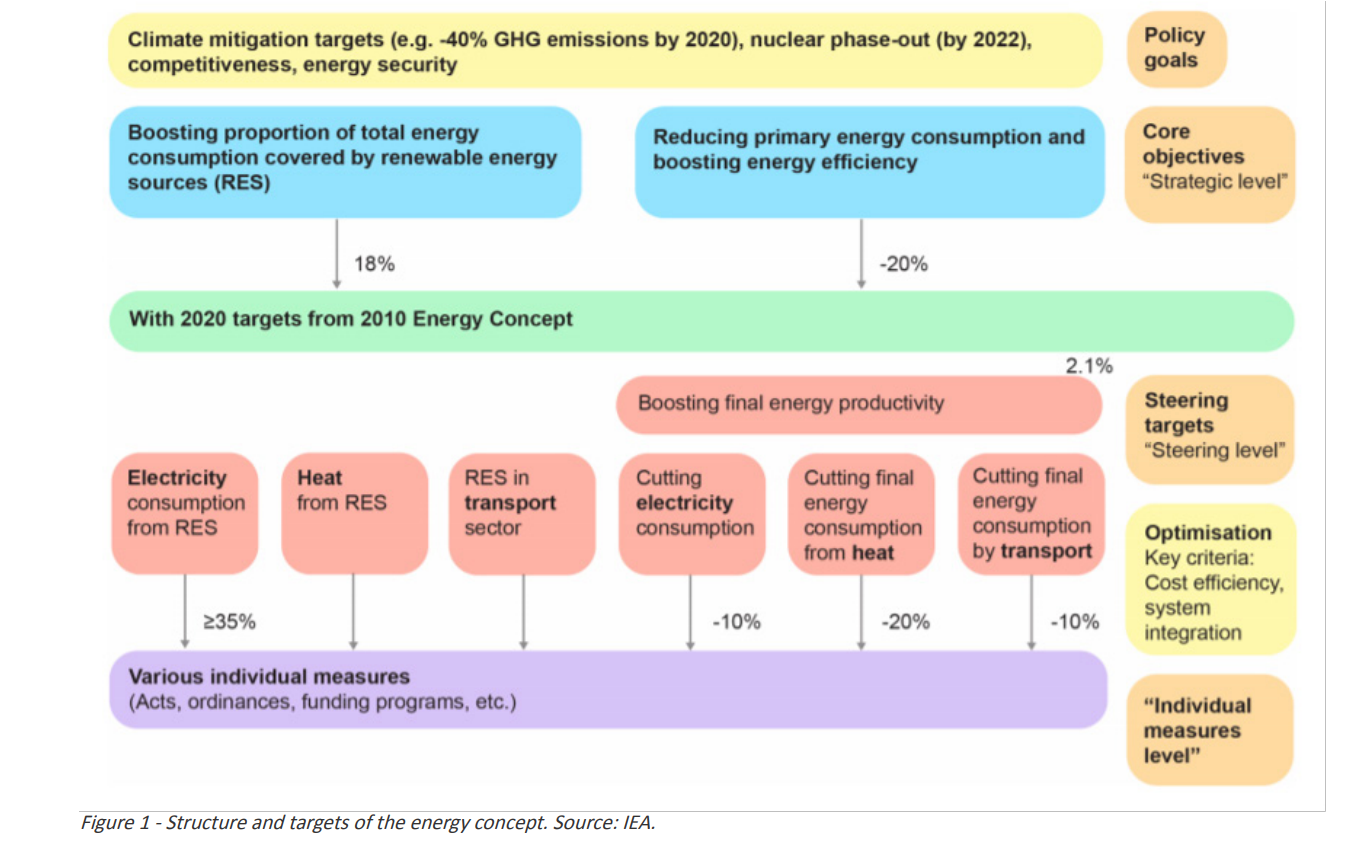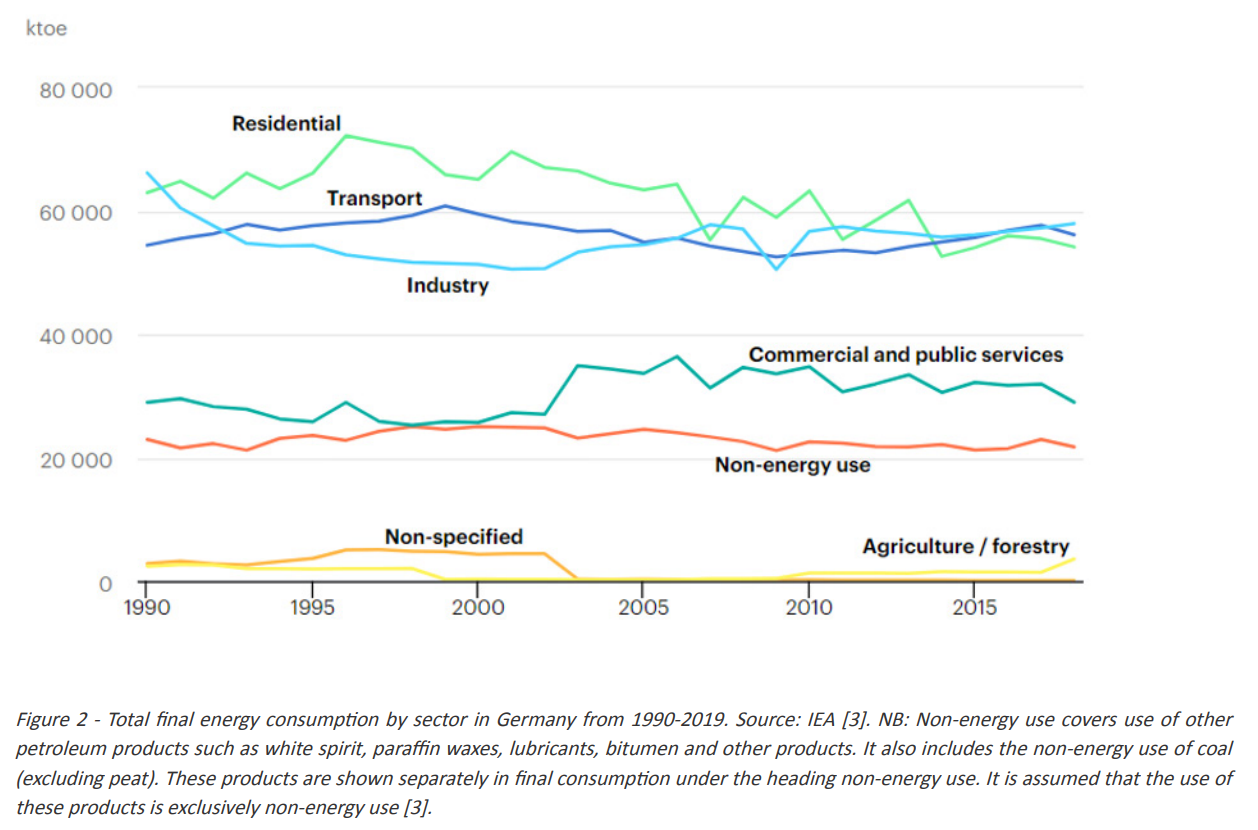From Nuclear Phase-out to Renewable Energy in Germany: Can Natural Gas Operate as a Bridging Fuel?


· 8 min read
When it comes to their electricity mix, Germans are quite vocal on what they don’t want. Nuclear power? “Nein Danke”! Coal? “Climate killer”! Those were not only the slogans of the environmental movement, but also became the foundation for the phase-out from both technologies until 2022 (nuclear) and 2038 (coal). While the goal for 2050 is a carbon-neutral energy system, the question arises which technology can bridge the remaining time until a fully-renewable-based energy system is established. Among others, the International Energy Agency (IEA) therefore underlines the role of Natural Gas. This article contextualises the economic and political developments concerning natural gas in Germany and its role in the upcoming years.
The crucial role of national gas in the transition towards low-carbon technologies is far from being a coincidence and can be explained with several arguments. Above all, the German economy has been showing an early interest in natural gas for these past decades, becoming thus the world’s 8th largest natural gas consumer in 2018. Covering more than 25% of its total primary energy use in 2019, natural gas is more efficient, can be easily stored and provides a strong operational flexibility and safety. In addition, gas-fired plants lower the requirement in time and capital costs when compared with renewable energy facilities, which eases investment decisions for many firms. Overall, a range of econometric assessments have highlighted the existence of crucial linkages operating between natural gas consumption and economic growth in various economies. Providing far-reaching policy implications, a unidirectional causal relationship running from natural gas consumption to economic growth may emerge if the economy is considered as an energy dependent one. In line with the “growth hypothesis”, any policy limiting the deployment of natural gas may adversely affect the economic indicators. Therefore, natural gas seems to be an attractive and relevant option of energy substitute among other fossil energy sources (notably coal-burning power plants). Although it remains non-carbon neutral, generating power based on natural gas is less environmentally harmful than other non-renewable resources as it releases less CO2 emissions into the atmosphere. In this quest, it has emerged as a cheaper, cleaner, and non-negligible alternative source of power, especially under a context of energy transition.
Resulting from numerous controversies and early protests movements, the German decision to phase out from nuclear power by 2022 and from coal until 2038 will have drastic consequences. Naturally, a critical gap will emerge in the power supply. And one should not omit that still in 2011, coal and nuclear have made up more than 85% of the German power supply. Thus, it calls for comprehensive energy measures aiming at filling this differential. While low-carbon resources are heavily promoted to take an important share in the near future, electricity remains substantially generated from non-renewable energy sources and nuclear power. Thus, pressure is high for the Energiwende. Although several policy measures have been implemented to support the research and the deployment of low-carbon energies, research papers and policy reports identified several key barriers to the adoption of renewable energy technologies. Consequently, in line with the IEA’s recommendations (i.e., Germany should “clearly convey the role of natural gas” in the future), natural gas is seen as a bridging fuel able to ensure a feasible energy transition towards a long-run sustainable path.

But five unavoidable obstacles should be addressed. First, due to insignificant domestic fuel resources, Germany must rely on massive imports, covering about 94% of the gas consumed annually. As over a third of all imports comes from Russia, with an increasing tendency, Germany’s reliance on natural gas thereby causes tensions with its neighbours and partners, most notably over the almost completed North Stream 2 pipeline, which is considered as geopolitical threat by the United States and Poland.
Second, with a length of about 35,000 km, the German high-pressure gas transport infrastructure faces important challenges. Deploying transport-related infrastructure for natural gas can be correlated with pipe leakages, harmful for the environment, and whose quantification is at the centre of ongoing research. Third, another barrier for gas stands in its lack of cost-effectiveness (known as the “missing money” problem in the literature). Indeed, when electricity generation from renewables increases, prices for power may fall lower than the costs of necessary investments. Fourth, one cannot avoid the fact that the global benefits from the shift towards power-based natural gas remain conditional to adequate environmental regulation decisions. To avoid a serious rise in environmental pollution, proper policies need to target all “fugitive emissions” by enhancing the deployment of new highly efficient and flexible gas power plants, but also on the possible capture and storage of carbon residuals efficiency along the whole power generation process.
Fifth, when looking at the structure and targets set by the Energy Concept (Fig. 1), one finds that reducing the consumption of primary energy through efficiency is at the forefront of the Greenhouse Gases (GHG) reduction strategy. By boosting the fuel productivity, the government projects to achieve significant emissions cuts in terms of electricity and heat consumption, while the transport sector is thought to contribute substantially to this dynamic.
This objective is laudable but comes up against a critical obstacle: the level of total energy consumption of the German economy. Fig. 2 presents the time plots of total final energy consumption by sector in Germany from 1990 to 2019. Data are collected from the IEA. One striking observation is that, although the global energy consumption has almost stagnated over time, industry, transport, and residential sectors remain highly energy-intensive. This indicates that the deployment of a low-carbon electricity capacity should not only cover the gap created by the abandonment of nuclear power, but also meet the heavy energy needs required by domestic and industrial operations. Finally, one should not avoid the progressive electrification of the transport sector in future power and environmental planning. While expecting short-run benefits from the current energy efficiency measures is limited, it would undoubtedly facilitate the development of a green power sector by lowering the energy demand in the long-run. In-between, natural gas may ensure a tailored supply of electricity to those sectors.

For the above-mentioned reasons, natural gas imports emerge as a relevant strategy to address the German challenge and reconcile its short- and long-run policy constraints. Thus, beyond allowing the development and the market penetration of renewables on the long-run (i.e., the “bridging” purpose), natural gas could also act as a “backup generator” able to meet the remaining loads depending on the well-known volatility of power-based renewables across time and seasons. Naturally, in a 100% renewable-based energy system, hydrogen and methane, produced with renewable energy (power-to-gas), would play this role. But reaching the substantial demand requires time and the further development of the necessary technology, so in the medium-term, most prognoses see an increasing share of natural gas in electricity production until 2030. While it was mostly coal and the rising share of renewables that initially replaced the nuclear power plants that have been taken off the grid after 2011, the share of natural gas in power generation is now on the rise again due to an increase in the CO2 price and the legally decided coal phase-out. Up to now, besides its utilization for power and coupled power-and-heating generation purposes, a substantial share of gas imports is rather used for industrial, private consumption and trade purposes. While its consumption by households will decline as efficiency rises, Germany is not sheltered from a significant natural gas surge in the near future.
Besides the intense public debate on the time horizon of the coal phase-out, Germany's energy policy debates in 2020 revolved primarily around the Federal Government's hydrogen strategy, which was adopted in the summer. In contrast, natural gas often seems to be overlooked in the public debate. But while it may not be visible at first sight, the debate about the orientation of the hydrogen strategy was indeed decisive for the future role of natural gas. The Federal Ministry for the Environment, Nature Conservation and Nuclear Safety, led by the social democrat Svenja Schulze (SPD), insisted that only “green” hydrogen would be promoted. Her conservative colleague in the Ministry for Economic Affairs (BMWi), Peter Altmaier (CDU), however, also considered “blue” and “grey” hydrogen as indispensable for the transition process. While this play of colours initially may look like a question of detail, it actually conceals the future role of natural gas. While “green” hydrogen is produced by electrolysis from water with the use of renewably produced electricity, “blue'' and “grey” hydrogen is extracted from natural gas. The hydrogen is thereby considered blue instead of grey, if the CO2 released during this process is stored using Carbon Capture and Storage (CCS) and is not released into the atmosphere.
The debate on the priority setting of the hydrogen strategy was closely followed and commented by the lobbying associations of both the gas industry and renewable energies thus forming a decisive arena in 2020 in which the future of natural gas in Germany was negotiated. With promoting “CO2-neutral” hydrogen (including the blue one) and “technology openness” (e. g. regarding hydrogen cars instead of focussing on more efficient battery electric vehicles), proponents of natural gas present it as an important component of the future’s energy system, instead of a fossil technology which has to be overcome. The Christian Democratic governing parties CDU and CSU are open to this view. They regard CCS as an important step towards climate neutrality, even though concrete experimental projects often meet with resistance from the population and plants adopting CCS are predicted to still have significantly higher overall life-cycle carbon emission than renewable technologies.
Drawing on insights from an economic and a political perspective, our analysis has shown that natural gas will clearly play a role as "bridging fuel" in the road towards a renewable-based energy system in Germany. The extent to which natural gas will be needed in this transformation process, however, will depend first and foremost on the success of the German government's energy efficiency efforts. If it succeeds in significantly reducing the energy demand in the coming years, it can thus reduce its dependence on natural gas, including the associated difficulties outlined in the analysis. The planning of future gas infrastructure should be based on realistic assumptions about the future needs of the electricity, mobility, heat and industrial sectors.
To see the list of references, please check pages 31-36 here.
Energy Voices is a democratic space presenting the thoughts and opinions of leading Energy & Sustainability writers, their opinions do not necessarily represent those of illuminem.
illuminem briefings

Hydrogen · Energy
illuminem briefings

Energy Transition · Energy Management & Efficiency
Vincent Ruinet

Power Grid · Power & Utilities
World Economic Forum

Renewables · Energy
Financial Times

Energy Sources · Energy Management & Efficiency
Hydrogen Council

Hydrogen · Corporate Governance